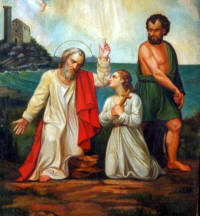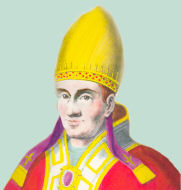
Daily Readings for:July 28, 2014
(Readings on USCCB website)
Collect: O God, protector of those who hope in you, without whom nothing has firm foundation, nothing is holy, bestow in abundance your mercy upon us and grant that, with you as our ruler and guide, we may use the good things that pass in such a way as to hold fast even now to those that ever endure. Through our Lord Jesus Christ, your Son, who lives and reigns with you in the unity of the Holy Spirit, one God, for ever and ever.
RECIPES
ACTIVITIES
o Religion in the Home for Elementary School: July
o Religion in the Home for Preschool: July
PRAYERS
o July Devotion: The Precious Blood
o Novena In Honor of Saint John Marie Vianney
· Ordinary Time: July 28th
· Monday of the Seventeenth Week of Ordinary Time
Old Calendar: Saints Nazarius and Celsus, martyrs; Saints Victor I, martyr, and Innocent I popes
According to the 1962 Missal of St. John XXIII the Extraordinary Form of the Roman Rite, today is the feast of Sts. Nazarius and Celsus, first century martyrs, whose bodies were found by St. Ambrose in 395. It is also the feast of Sts. Victor I and Innocent I both Popes of the early Church. St. Victor I was pope from 189 to 198; he regulated the date for the celebration of Easter throughout the Church in accordance with the Roman tradition. St. Innocent I (401-417), a contemporary of St. Augustine and St. Jerome, was one of the greatest early popes. He was one of the great champions of the primacy of the Holy See.
Sts. Nazarius and Celsus
Nazarius was baptized by the blessed Pope Linus. He went into Gaul, and there baptized a child named Celsus whom he had instructed in the Christian doctrine. Together they went to Treves, and in Nero's persecution were both thrown into the sea, but were saved by a miracle. They proceeded to Milan, where they spread the faith of Christ; and as they with great constancy confessed Christ to be God, the prefect, Anolinus, condemned them to death. Their bodies were buried outside the Roman gate, and for a long time remained unknown. But through a divine revelation they were found by St. Ambrose, sprinkled with fresh blood, as if they had but just suffered martyrdom. They were translated to the city and buried in an honorable tomb.
Excerpted from The Liturgical Year, Abbot Gueranger O.S.B.
Symbols: Swords; armour and millstones.
St. Victor I
Victor, an African by birth, governed the Church in the time of the Emperor Severus. He confirmed the decree of Pius I, which ordered Easter to be celebrated on a Sunday. Later on, Councils were held in many places in order to bring this rule into practice, and finally the first Council of Nicea commanded that the feast of Easter should be always kept after the fourteenth day of the moon, lest the Christians should seem to imitate the Jews. Victor ordained that, in case of necessity, baptism could be given with any water, provided it was natural. He expelled from the Church the Byzantine, Theodosius the currier, who taught that Christ was only man. He wrote on the question of Easter, and some other small works. In two ordinations which he held in the month of December, he made four priests, seven deacons, and twelve bishops for different places. He was crowned with martyrdom, and buried in the Vatican on the fifth of the Calends of August, after having sat nine years, one month, and twenty-eight days. He died in the year 199 A.D.
Excerpted from The Liturgical Year, Abbot Gueranger O.S.B.
St. Innocent I
Innocent was born in Albano, Italy. He lived during the time of Saints Jerome and Augustine. He became Pope, on December 22, 401. Jerome, writing to the virgin Demetrias, says of him: "Hold fast to the faith of holy Innocent, who is the son of Anastasius of blessed memory and his successor in the apostolic throne; receive no strange doctrine, however shrewd and prudent you may think yourself."
During his pontificate, Innocent emphasized papal supremacy, praising the bishops of Africa for referring the decrees of their councils at Carthage and Milevis in 416 that condemned Pelagianism, to the pope for confirmation. This confirmation stirred St. Augustine to pen his famous remark: "Roma locuta, causa finita est" (Rome has spoken, the matter is ended).
Innocent was pope during the capture and sack of Rome by the Goths under Alaric in 410. He condemned the heresies of Pelagius and Celestinus, decreeing that children, even though born of a Christian mother, must be born again by water, in order that their second birth may cleanse away the stain they have contracted by the first. He also approved the observance of fasting on the Saturday in memory of the burial of Christ our Lord. He fought the unjust removal of Saint John Chrysostom and spoke strongly in favor of clerical celibacy. He sat fifteen years, one month, and ten days. Innocent died in Rome, March 12, 417 and was buried in the cemetery called ad Ursum Pileatum.
Some material excerpted from The Liturgical Year, Abbot Gueranger O.S.B.
Symbols: Angel holding a crown.
Things to Do:
- Read four letters of Correspondence between Innocent and Saint John Chrysostom.